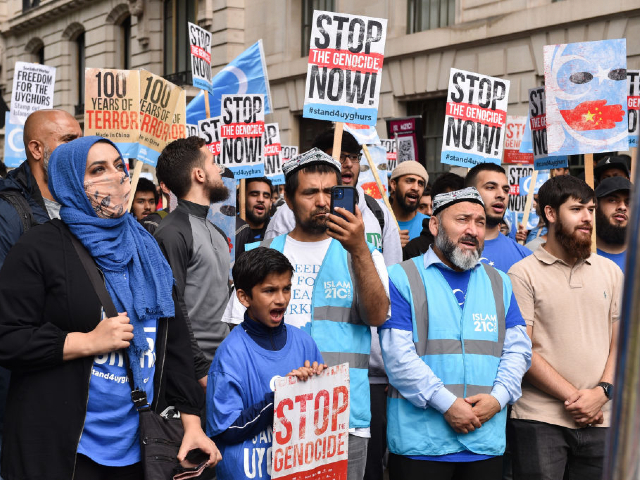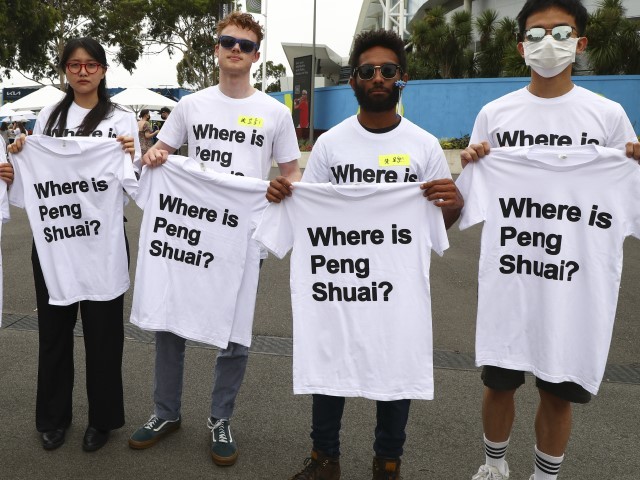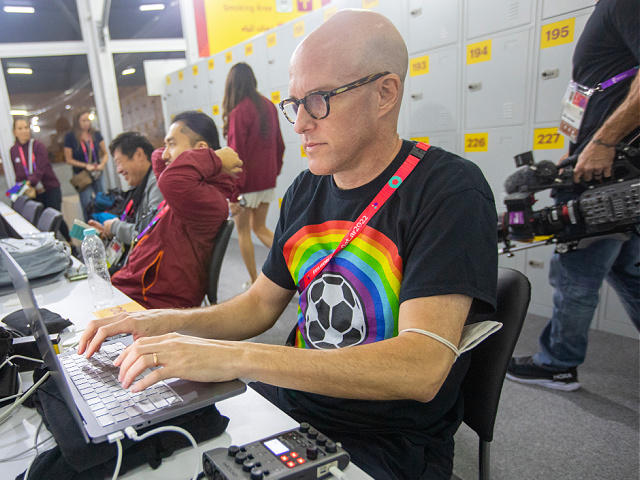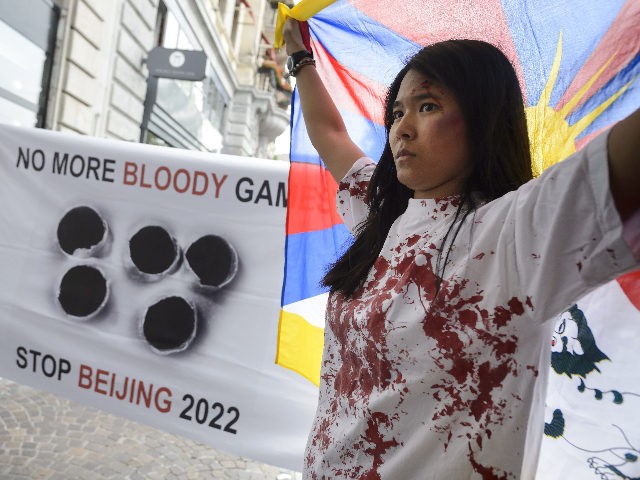The world’s most prestigious sporting institutions dove headfirst into a return to normal following two years of pandemic rules in 2022 – with the help of some of the planet’s most egregious human rights abusers.
The year began with the 2022 Beijing Winter Olympics, which took place after months of the International Olympic Committee (IOC) helping the Chinese Communist Party cover up the disappearance of Peng Shuai, a Wimbledon tennis champion who went missing after accusing a top Chinese Olympics official of raping her. Peng only reemerged at the Olympics to claim she had never accused Zhang Gaoli, who ran China’s Olympics operations for years, of rape and she had “never disappeared.” The Chinese government used the Olympics to cover up its ongoing genocide of Uyghurs and other non-Han ethnic groups in occupied East Turkistan.
The year ended with FIFA, the world soccer organization, applauding the government of Qatar for hosting what it deemed to be the best World Cup championship in history. Qatar notoriously violates the human rights of its migrant workers, and its own government admitted to hundreds of worker deaths during the construction of World Cup facilities – but only after the tournament had begun. At least three journalists died during this year’s World Cup.
What could have been a comeback year for international sports – stunted by the Chinese coronavirus pandemic, as most prominently seen by the dour state of affairs at the 2021 Tokyo Summer Olympics – will instead go into the history books as an endorsement of flagrant human rights abuses, a moral disgrace.
The Chinese Communist Party is the world’s most prolific human rights abuser, persecuting nearly every demographic of people in the country aside from fervent Han Chinese communists. Its most heinous ongoing known crime is the Uyghur genocide, which it has perpetrated at an industrial scale since at least 2017. The Communist Party continues to this day a campaign of erasure against Uyghur, Kazakh, Kyrgyz, and other non-Han cultures in East Turkistan through the destruction of mosques, cemeteries, cultural centers, and other significant cultural spaces. It has imprisoned as many as three million people in concentration camps, where survivors say they are beaten, tortured, indoctrinated into communism, enslaved, gang-raped, and forcibly sterilized, among other crimes. Chinese authorities claim the camps, which it has dubbed “vocational training centers,” have been dismantled, but human rights investigations have revealed China has simply bussed concentration camp victims into factories elsewhere in the country, where they remain enslaved.

Protesters hold placards expressing their opinion during the demonstration. Uyghurs and UK Muslim organizations gathered opposite the Chinese embassy in London to protest against the Chinese government’s involvement in ongoing human rights abuses against Uyghurs and other ethnic minorities (Photo by Thomas Krych/SOPA Images/LightRocket via Getty Images).
The IOC and broadcasters such as NBC in America roundly ignored global protests to prevent the Olympics from being held in such a country. IOC leaders routinely praised China as an exemplary host, and Chinese propaganda outlets condemned protesters as “selfish” for allegedly trying to deny athletes the right to compete. The Olympics did not address the genocide in any way, other than featuring an allegedly Uyghur athlete in the Opening Ceremonies – who promptly disappeared after China used her until she made a statement denying the genocide.
Also marring China’s hosting duties for the Beijing Winter Olympics was the ongoing scandal surrounding Peng Shuai. In November 2021, Peng published on her social media profiles a long, confessional-style post accusing Olympics official Zhang Gaoli of raping her and forcing her into an extramarital relationship that led her to contemplate suicide. The post was up for mere minutes before Chinese censors erased it, but users saved screencaps and shared translations of the post. Peng, meanwhile, disappeared entirely from the public eye, including on social media.

Supporters of Chinese tennis player Peng Shuai hold up T-shirts ahead of the women’s final at the Australian Open tennis championships in Melbourne, Australia, Saturday, Jan. 29, 2022 (Tertius Pickard/AP).
When she resurfaced, Peng became an ardent cheerleader for the Beijing Olympics. She appeared front row at winter sporting events that even she admitted she had not had any previous interest in or fully understood. She insisted, “I never disappeared” and claimed she never accused anyone of rape. Prior to her appearances at the Olympics, IOC officials published photos allegedly showing video calls they held with Peng to prove her safety, thus defending the reputation of the Chinese Communist Party.
Human rights violations in China were far from the only shameful events of the Beijing Olympics – athletes claimed to have been poorly fed and randomly forced into quarantine camps with little information – but the wanton disregard for basic civil rights has now become a hallmark of the IOC.
FIFA self-inflicted similar wounds with the 2022 Qatar World Cup. In 2020, the U.S. Department of Justice accused FIFA, notoriously one of the world’s most corrupt organizations, of taking bribes in exchange for allowing Qatar to become the first Middle Eastern country to host the tournament. The idea faced major problems from the start, most prominently Qatar’s dangerous summer temperatures, known to rise to as high as 105ºF on an average summer day. FIFA evaded this issue by moving the tournament into November, but then disrupted the annual schedules of the world’s best soccer players, accustomed to playing the World Cup in July.
Human rights abuses rapidly became an issue in two ways in Qatar: the flagrant abuses of migrant workers, largely deprived of their right to sue in the event of employers failing to pay or endangering their lives, and the country’s fundamentalist sharia legal system, which largely denies women basic human rights and strictly punishes anyone suspected of homosexuality or other actions or conditions dictated to be haram. Shortly before the World Cup began, an exposé published by the British publication i revealed the testimonies of men who said Qatari officials had entrapped them into situations where they were accused of being gay. One man said Qatari police gang-raped him in a hotel room before arresting him for homosexuality.
For years, Qatar denied that any workers had been harmed in the construction of stadiums, hotels, and other facilities for the World Cup. In late November, a week into the tournament, Hassan al-Thawadi, the head of the Qatari Supreme Committee for Delivery and Legacy, which is in charge of World Cup preparations, casually admitted that up to 500 people had died working to build World Cup infrastructure. Even that number, while higher than the three that Qatar had previously admitted to, was far lower than the 15,021 people killed, as tallied by Amnesty International in 2021.
The Qatari government’s strict ban on LGBT iconography, or gay identity at all, prevented Western players from wearing rainbow armbands and resulted in officials manhandling attempted protesters at the events. The most prominent of these cases was American journalist Grant Wahl’s attempt to wear a pro-LGBT T-shirt into a soccer stadium, which resulted in his expulsion. The 48-year-old died suddenly days later.

Journalist Grant Wahl (right) works in the FIFA Media Center before a FIFA World Cup Qatar 2022 Group B match between Wales and USMNT at Ahmad Bin Ali Stadium on November 21, 2022, in Al Rayyan, Qatar. He had been detained earlier by stadium security for wearing a rainbow-colored t-shirt before later being allowed to enter the stadium (Photo by Doug Zimmerman/ISI Photos/Getty Images).
Wahl was joined by two other journalists, British producer Roger Pearce and Qatari photographer Khalid al-Misslam, in dying at the World Cup. FIFA opened condolence books in media centers for the men.
Some abuses occurred only in response to the appearance of LGBT iconography. One group of soccer fans from Pernambuco, Brazil, suffered an assault at the hands of Qatari officials for waving their state flag, which features a rainbow, a sun, and a cross on it. The Pernambuco flag has no connection to the LGBT movement, but the rainbow appeared to have confused local officials.
The World Cup ended with one last humiliation to participants – the bizarre spectacle of widely hated meme chef Nusret Gökçe, known as “Salt Bae” for using salt in his food, invading the field, hassling the winning Argentine soccer team, and hoisting the trophy – that has resulted in an internal FIFA investigation to figure out who allowed him to crash the festivities. Gökçe, too, is an open supporter of some of the world’s most violent socialist regimes, once boasting of serving Venezuelan socialist dictator Nicolás Maduro at one of his restaurants.
While the Winter Olympics and World Cup dwarf all other sporting events in size and importance this year, myriad smaller abuses plagued the international sporting world, most visibly in tennis – where a variety of political circumstances converged to cast doubt on the legitimacy of the four Grand Slam champions on the men’s side.
Novak Djokovic, one of history’s winningest players, was banned from two of the four Grand Slams for not ingesting a Chinese coronavirus vaccine product. Djokovic could not play in the Australian Open in January after the government dramatically revoked a visa they had issued for him because of his unvaccinated status – after imprisoning him in a migrant detention facility. Djokovic also missed the U.S. Open because of a ban, under leftist President Joe Biden, on some unvaccinated foreigners entering the country legally.
A third Grand Slam, Wimbledon, banned ethnic Russian and Belarusian players from participating in an apparent show of solidarity with Ukraine – preventing two of the current top ten men’s players, Daniil Medvedev and Andrey Rublev, from participating. The decision seemed particularly cruel to Rublev, who had openly protested Russia’s invasion of Ukraine before being banned from playing over Russia’s invasion of Ukraine.
Wimbledon was also host to an abuse unrelated to the Ukraine war committed by its security officials – a protester wearing a shirt reading “Where is Peng Shuai?” being expelled from the men’s singles final. The protester, later revealed to be Australian anti-Chinese communism activist Drew Pavlou, could be seen on American Wimbledon television broadcasts being shoved down a flight of stairs, but Wimbledon officials denied that this ever happened and claimed security merely acted to remove a disruptive audience member.
With no major international events at the level of the Olympics or the World Cup scheduled for 2023, the sporting world has a chance to improve on its dismal 2022 record. Yet the worst of these infractions – glorifying repressive regimes, abusing the rights of fans, athletes, and workers alike – did not result in any high-profile firings or apologies, leaving little hope for change at the top levels of sports.

COMMENTS
Please let us know if you're having issues with commenting.